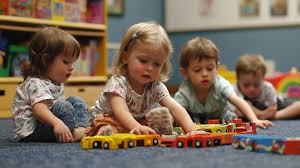Pediatrics focuses on the health and medical care of infants, children, and adolescents to support a child’s health from birth through young adulthood. A child’s development is a complex process involving physical, cognitive, and emotional growth. Understanding developmental milestones helps parents and healthcare providers support a child’s well-being. Here are some benefits of play in early childhood development:
Cognitive Benefits
Play provides a range of opportunities for children to develop problem-solving abilities. When a child spends time with puzzles, stacking blocks, or sorting objects by color and shape, they build skills in spatial relationships and logical sequencing. These activities encourage curiosity and exploration while supporting memory and attention span. Children learn to follow steps and make decisions as they experiment with cause and effect when figuring out which block will stabilize a tower.
Imaginative play, such as pretending to run a store or creating stories with action figures, provides children with practice in flexible thinking, planning, and creativity. They learn to invent new scenarios, sometimes using language or drawing to communicate ideas. Creative games help build vocabulary and narrative skills, which often transfer to reading and writing tasks in school. Counting objects during play lays a foundation for early math, while making predictions and testing ideas supports the development of scientific reasoning.
Social-Emotional Benefits
Play provides an opportunity for children to learn about themselves and others. When children play together, they discover what it means to share, negotiate, and work as a group. Games that require turn-taking, such as board games, build a sense of fairness and cooperation. Collaboration with peers often leads to empathy development as children observe and respond to each other’s emotions.
Role-playing activities, such as pretending to be doctors, allow children to explore different emotions and scenarios in a low-stress environment. They may act out a disagreement to see how it feels or take on a leadership role to practice decision-making. These activities offer lessons in managing emotions and navigating challenges. Completing a difficult task or overcoming a setback during play helps children build self-confidence, while experiencing disappointment teaches patience and emotional regulation.
Physical Benefits
Active play helps strengthen your child’s body and supports healthy growth. Children can develop their gross and fine motor skills through play. Here’s how:
- Gross motor skills: Activities like running, skipping, and climbing activate large muscle groups, improving balance and coordination. Outdoor games such as hopscotch or obstacle courses encourage varied movements, building strength and agility.
- Fine motor skills: Activities like molding playdough, threading beads, and building with small blocks require precise hand movements, enhancing dexterity and hand-eye coordination. This makes everyday tasks, such as dressing and writing, easier. Art projects help children refine their control and focus.
Pediatrics evaluates these skills through a variety of assessments tailored to a child’s developmental stage. They may use observation-based techniques, structured activities, or standardized tests to measure gross and fine motor skills. By assessing these areas, pediatricians can identify potential delays or challenges early and guide interventions or therapies.
Work With a Pediatrics Specialist Today
Supporting your child’s development means recognizing the value of play. A pediatrics specialist can guide you on age-appropriate milestones, answer your questions, and offer practical strategies. They help you understand and support your child’s unique needs. If you have questions about your child’s developmental progress, contact a pediatric office today.










